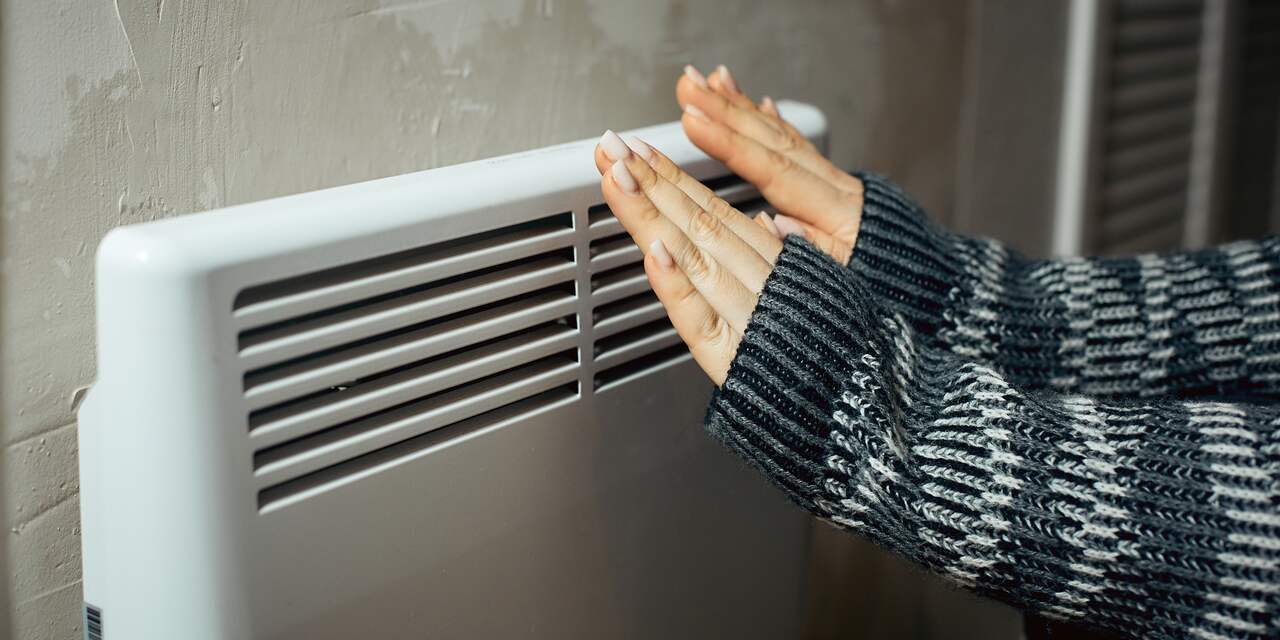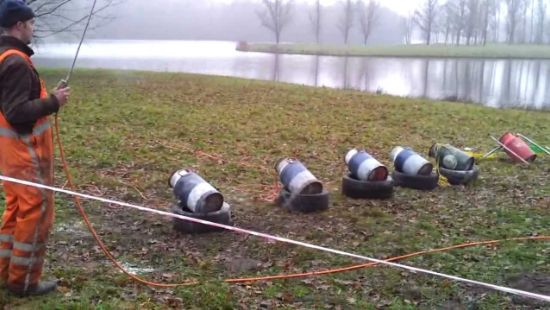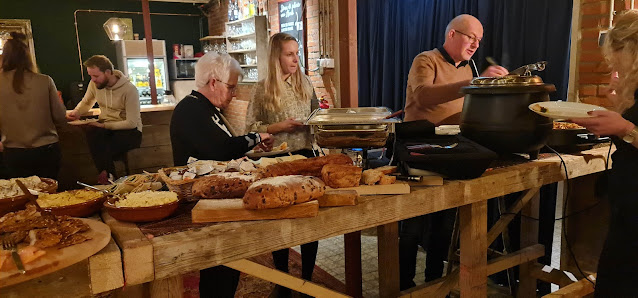Week 23 Not so much drought
This was from nu.nl. A question from a reader... it was interesting to think that growing up in Australia there was so much to learn about the Snowy River, Ord River, Thompson Dam and so many more from the "world's driest continent", compared with living with (and having to manage) the water here in the Netherlands.
I'd recommend again one of my podcasts (in English by a Melbournian)
A couple of the early episodes describe how the (too much) water shaped the culture of the people and the country itself.
(And now I'm reading about "making the country more drought resistant").
According to Schilte, it is especially important that the groundwater is replenished as much as possible and that as little disappears as possible. That is why the water level is kept as high as possible all year round. "That's really a different starting point than in the past," she says.
In many places in the Netherlands, the water level is artificially lowered at the beginning of spring, for example because farmers have to go out onto the land with heavy machinery and want to sow: that does not go well on swampy soil.
But by keeping the water level high in the spring as well, a drought in the summer can be better absorbed. "We have no influence on whether there will be enough rain," says Schilte. It does mean a change for farmers. "They have to adjust their business operations a bit. For example, we agree that they will call as soon as their work is done and the weir can be raised again."
Ha! I had saved the above into Google Keep on Monday (It was Whitsunday or Pentecost - which is celebrated here with a day off for some - including us! they call it Pinkster - I can't find out why the name, but it is 50 days after Easter - as for Whitsunday).
It was pretty bad weather - we took the new cushions to the boat - but didn't stay.
Back home, light the fire and binge watch Netflix - in June!!
So, by Tuesday evening the TV news said that the rainfall had met it's monthly (required) target and the effect on crops was going to be minimal, after all. Our own rain gauge had 2 days of 25mm...
But it's the overall trend that we are more worried about, not just daily, weekly or monthly. It's certainly become noticeably different in my 30 years here.
They did a good job of renewing the cushions.
We still have the original colour in the wheelhouse...

A few "Odd Spots"
Highest taxes in the Netherlands
Each time, the OECD looked at additional expenditure for both the poorest and the richest 20 percent of the population and compared these figures with expenditure in 2015. The richest Dutch people now pay 6 percent more than in 2015, of which 5 percentage points are for energy.
With these figures, the Netherlands towers far above the other OECD countries. Poland comes in second with more than 7 percent for the poorest inhabitants and around 5 percent for the richest. About two thirds are the result of expensive energy. In France, the poorest pay 2 percent more and the richest 1.5 percent more.
The fact that the Netherlands is a frontrunner in this area may have to do with the high taxes on energy in our country. Compared to neighboring countries, taxes on fuel, electricity and gas in the Netherlands are very high. The tax on fuel was lowered in April, but that did not prevent the petrol price from breaking another record on Wednesday . The VAT (BTW/GST) on electricity and gas will be reduced from 21 to 9 percent in July.
With these figures, the Netherlands towers far above the other OECD countries. Poland comes in second with more than 7 percent for the poorest inhabitants and around 5 percent for the richest. About two thirds are the result of expensive energy. In France, the poorest pay 2 percent more and the richest 1.5 percent more.
The fact that the Netherlands is a frontrunner in this area may have to do with the high taxes on energy in our country. Compared to neighboring countries, taxes on fuel, electricity and gas in the Netherlands are very high. The tax on fuel was lowered in April, but that did not prevent the petrol price from breaking another record on Wednesday . The VAT (BTW/GST) on electricity and gas will be reduced from 21 to 9 percent in July.
Somewhere hidden deep in a typical 1970s office colossus is the beating heart of Dutch water management. In this Water Room in the Water Management Center of the Netherlands (WMCN) in Lelystad, a team of waterway specialists examines the water levels and the so-called 'Messages to Shipping' (BAS) on a daily basis.
On the basis of numerous data, the Water Chamber arrives at the expectations: precipitation, meltwater and drought. And also the magic number: the water level at Lobith on the Rhine comes from Lelystad.
The water levels are partly automatically generated by the system, explains Boonstra. The added value of the five advisers is mainly in their expertise. 'Sometimes we adjust expectations manually. To put it very simply: we look at the pluses and minuses on the Rhine. The Netherlands is, of course, the drain of the Rhine. If today it is -4 centimeters at Cologne, tomorrow it will also be -4 centimeters at Lobith.' However, there are many more factors to consider. If 20 millimeters of rain falls in the Moselle, that also has an influence. 'It is our job to inform skippers in good time so that they know where they stand.'
On the basis of numerous data, the Water Chamber arrives at the expectations: precipitation, meltwater and drought. And also the magic number: the water level at Lobith on the Rhine comes from Lelystad.
The water levels are partly automatically generated by the system, explains Boonstra. The added value of the five advisers is mainly in their expertise. 'Sometimes we adjust expectations manually. To put it very simply: we look at the pluses and minuses on the Rhine. The Netherlands is, of course, the drain of the Rhine. If today it is -4 centimeters at Cologne, tomorrow it will also be -4 centimeters at Lobith.' However, there are many more factors to consider. If 20 millimeters of rain falls in the Moselle, that also has an influence. 'It is our job to inform skippers in good time so that they know where they stand.'
Collecting data from Germany
On Friday, Janny needed to go to Leeuwarden for something, so I did a quick search for "Zeil voor boten" - Canvas for Boats. I only needed a small square for covering the salon hatch - it leaks slightly - so the easiest quick fix is to cover it.
So, I noted the first address I found and we headed off. Yeah, no worries - he cut a 800 x 900 bit from scrap and gave us some clips to hold it in place.
As we were looking around, we saw some photos of kilts - worn by Sean Connery, Prince Phillip and others - Janny asked what's that about and then we saw it - he makes kilts as well - mostly for Netherlands' Pipe Bands. And lots of other accessories. His displays were all packed for a show in Groningen over the weekend.
The website is here...
Pipe Band Uniforms
The Pipe Band Uniform is the uniform that distinguishes the bands from each other.
If you want your band to perform up to standard not only musically but also visually, we're here to help and assist you with the best choice of your outfit and all the accessoires and accroutrements that go with it.
It doesn't matter if you're looking for a starterkit or clothing for an existing band. We can supply almost anything you want.
I made the observation that he would hardly have time for the boat stuff! Yeah, busy over summer but the kilts and other stuff are all year round.
Especially, he said, "after Brexit". A lot more people (mostly Dutchies, but not all) are now buying from him because of the extra costs from Scotland - including 30% import duty that wasn't payable before Brexit.
Janny notices it as well with a few handcrafts from England - so, only a couple of instances, but imagine what it must be across the board.
The overloaded electricity grid
Another podcast that I listen to (in English) is Dutch News.nl . They had a bit on the electricity grid - mainly that two Provinces (down south) are formally "full" - so much so that some solar panel arrays have to be shut off at certain times. It's heading that way in the rest of the country as grid operators weigh up the cost of increasing capacity.
Personally, I would like to be able to store what we produce (49000kwh last year) or at least have the village with some storage capacity. I think the electricity companies are against the idea, although it is happening in Germany and Belgium that I know of. Even IKEA are advertising large capacity storage batteries!
Nitrogen production
The Government has officially announced that many farms will have to close - be bought out - the farmers are up in arms (again) and at least one major political party has come out against the proposal.
Much more information about environmental issues here (in English)
We have kids again this weekend...
...but we escaped to the boat anyway! Janny is "on call" and is only 30 minutes away, if needed. Our preferred mooring was occupied so I just motored forward a bit and let the wind blow us onto this spot - all of 25 metres! Imagine the fuel savings...











Comments
Post a Comment